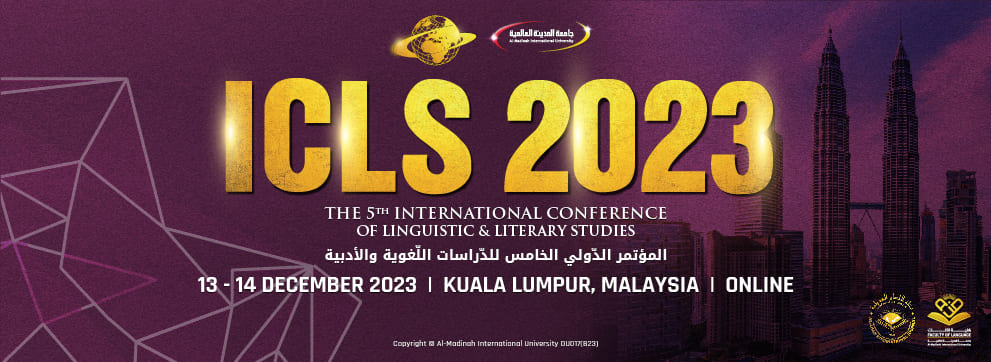The first theme:
The Integration of linguistic and human sciences
-
- The impact of integration of sciences in university education and its cultural necessity
- Knowledge integration representations in influential linguistic and literary figures
- Institutional experiences in knowledge integration between linguistic and human sciences.
- Knowledge integration applications in university programs and curricula
- Obstacles to knowledge integration and means of treatment
The second theme:
The miraculous form of the language of the Holy Qur’an and the Prophet’s Sunnah and its regenerative role for the language
-
- The miraculousness of the Quranic words in their contexts.
- Rhetorical and linguistic miraculousness in the verse.
- Miraculousness of the Holy Qur’an in the multiplicity of topics of the surah
- Prophetic rhetoric in the hadith.
- The prophetic rhetoric in the prophetic words in their contexts.
- The prophetic miraculousness (Peace be upon him) in the sentences that the Arabs did not precede.
- The prophetic eloquence (Peace be upon him) in his sermons.
- The prophetic eloquence (Peace be upon him) in his messages.
The third theme:
Innovation in linguistic and literary studies
-
- Modern trends in phonetic, morphological, syntactical and semantic studies.
- Linguistic conflict and coexistence
- Applied Linguistics
- Linguistic terms in applied sciences
- Comparative critical studies
- Discourse analysis mechanisms
- Visual discourse analysis (the art of reading a picture)
- Literary arts (poetry, story, novel, play, essay, etc.)
- Influence between world literatures Influence and comparison between them
- Modern experiences in literary studies
The fourth theme:
E-learning and the ambition of the current era
-
- Building and developing educational curricula
- Modern technology in the service of the educational process
- The best methods adopted in teaching and e-learning
- Obstacles to e-learning
- Symptoms of e-learning in light of the Corona pandemic.
- Fundamentals of the advancement of e-learning
- Successful experiences in e-learning
The fifth theme:
Arabic Language distance-learning to non-native speakers, experiences, obstacles and solutions
-
- Arabic language books and curricula for non-native speakers
- The role of teachers of Arabic language programs for non-native speakers
- Quality, tests and evaluation of students in Arabic language programs for non-native speakers
- Academic research and programs for teaching Arabic to non-native speakers
- Efforts of individuals and institutions in the field of teaching Arabic to non-native speakers
- Technology in teaching Arabic to non-native speakers
- Basics of developing the quality of teaching Arabic to non-native speakers:
The sixth theme:
Language: (innovation, leadership and creativity)
-
- The relationship between the Arabic language, creativity and leadership.
- Mastering the Arabic language and its role in new creativities and innovations.
- Understanding the history of the Arabic language, sciences and knowledge in the Arab and Islamic eras.
- The relationship between intelligence, creativity and mastery of the Arabic language.
- Studies and researches in the Arabic language, creativity, innovation and leadership.
- The Arabic language and the knowledge society.
- The Arabic language and the other languages and their relationship to creativity.
The seventh theme:
The humanistic propensity in language and literature and its role in coping with natural disasters and crises
-
- The dissimilarity between ancient and modern literature in humanistic propensities
- Humanistic propensities in Arabic literature and other literatures.
- The role of humanistic propensities in coping with natural disasters and crises.
The eighth theme:
Translation and its role in bringing cultures closer
-
- Recent trends in English language studies and linguistics
- Employing translation to serve the language
- Teaching foreign languages
- The role of translation in bringing cultures closer.
The ninth theme:
Social media and their impact on linguistic development
-
- The impact of social media on language soundness.
- Standard Arabic language teaching applications on the Internet.
- Arabic language and social networking sites opportunities and challenges.
- The impact of social media on language development.
The tenth theme:
Linguistic academies and periodicals as a factor in the civilizational advancement
-
- Among the factors of renaissance: printing presses, linguistic academies, periodicals, and libraries.
- Efforts of linguistic academies in language’s rising and keeping pace with the era.
- Efforts of linguistic academies in Arabization and generation
- Arabic linguistic academies, function and performance
- Criticizing Linguistic academies and periodicals

